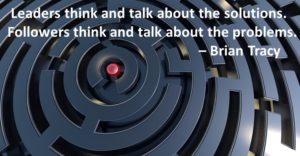Leaders are forward-thinking. As important as completing today’s tasks, leaders focus on building their people and the organization in the process. An element of developing the members of the team is identifying the behaviors that hinder performance and coaching to new levels of capability.

When team members fail or underperform, one of the keys of successful coaching is to focus on solutions, not on the problem. Rather than saying “Why did this happen?” we should say “What did you learn?” or “What can you do different the next time?” Every failure should be viewed as a learning and growth opportunity.
If we focus on the “why” or the problem we are not developing for the future, but are focusing on the past. In fact, neuroscience tells us that we are raising the attention on the problem and likely to further imbed it into the team member’s thought process, therefore possibly increasing the likelihood of repetition in the future. If our discussion focuses on the “what” or the solution, we reinforce that mindset and make it more likely as a future behavior. When the next instance arises, we will have developed a thought process that can achieve a better outcome.
There are instances where a focus on the “why” or the problem makes sense. When we are addressing failure in a process, the “5 Why” methodology can lead to root cause identification. In this way, “why” leads to process improvement. But when dealing with people, the better question is a “what” question. For example,
- Not “Why did you not close the sale?” but “What would be another way to try to close the next sale?”
- Not “Why did you produce so much scrap?” but “What can you improve that will increase your quality levels?”
- Not “Why did you fail?” but “What will you do next time to increase the chance of success?”
When dealing with processes, ask “why?” When dealing with people, ask “what?”
By focusing the discussion on the solution rather than the problem, the leader helps the team member develop the analytical skills to break down the problem, consider alternatives, and make decisions. A discussion of the problem is a negative discussion of the past. The solution discussion is a positive discussion that looks to the future
Are you spending too much of your time and energy on the past or are you moving forward?

Add your comment